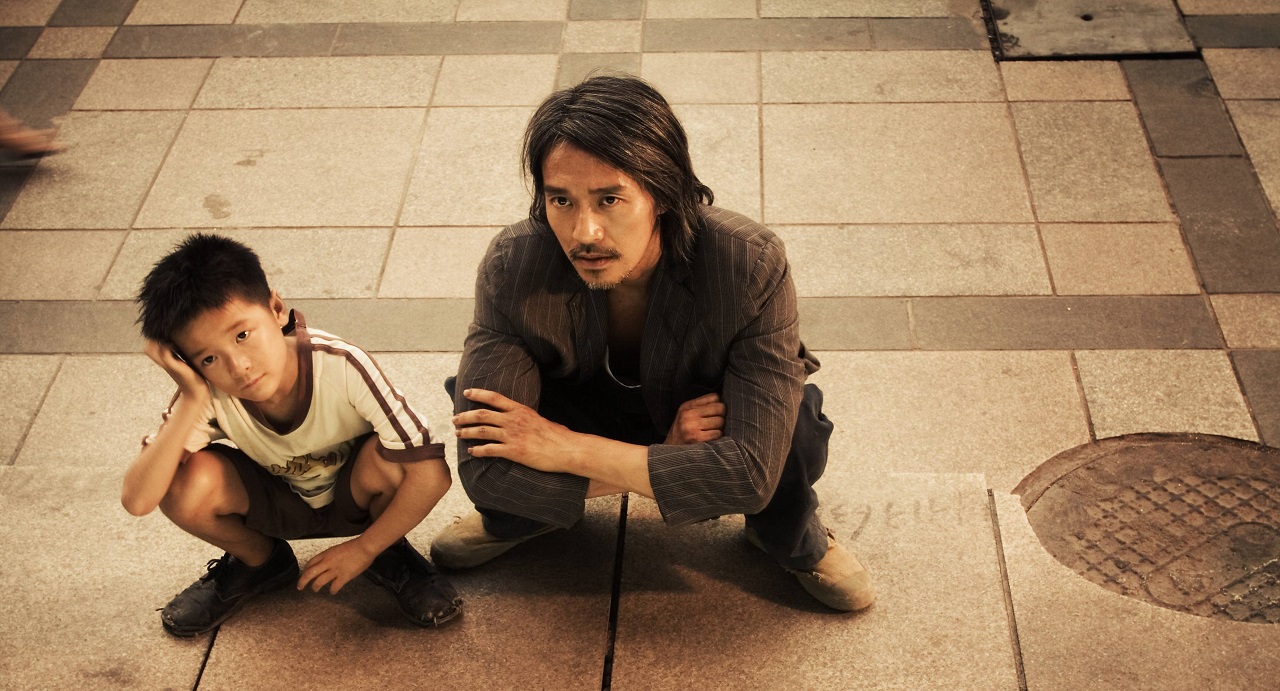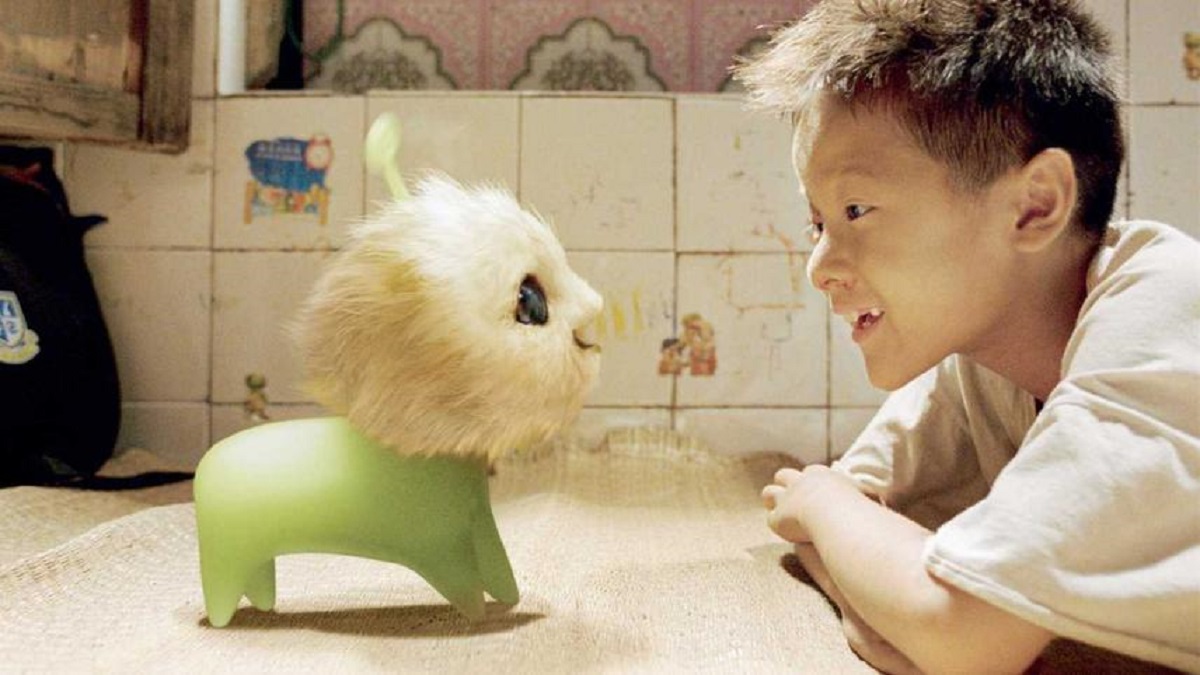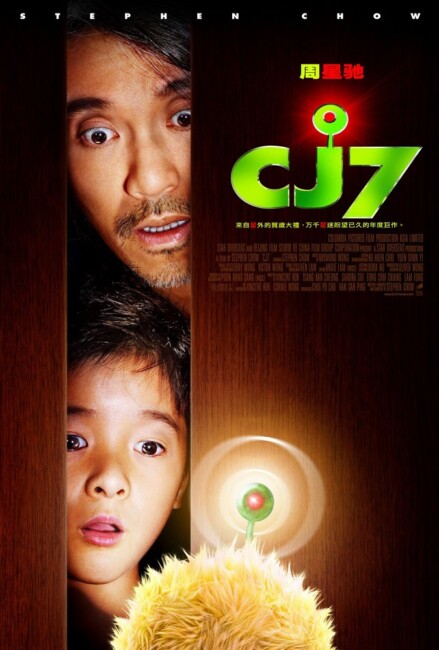(Cheung Gong 7 Hou)
Hong Kong. 2008.
Crew
Director – Stephen Chow, Screenplay – Stephen Chow, Fung Chih Chiang, Sandy Shaw Lai-King, Vincent Kok, Lam Fung & Tsang Kan Cheong, Producers – Stephen Chow, Chui Po Chu, Han San Ping & Shi Dong Ming, Photography – Poon Hang Sang, Music – Raymond Wong, Visual Effects Supervisors – Eddy Wong & Victor Wong, Visual Effects – Menfond Electronic Art & Computer Design Company, Production Design – Oliver Wong. Production Company – Star Overseas/Beijing Film Studio/Columbia Pictures Film Production Asia
Cast
Jiao Xu (Dicky Chow), Stephen Chow (Ti Chow), Shing-Cheung Lee (Mr Cao), Kitty Zhang (Miss Yuen), Chi Chung Lam (The Boss), Han Yong Wua (Maggie), Yao Wen Xue (Storm Dragon), Min Hun Fung (P.E. Teacher)
Plot
Dicky Chow goes to the Bo Street private school where he is made fun of and ridiculed because he is poor, often dirty and wears worn-out clothes. His father Ti works a tough construction job to pay for Dicky’s education, believing this will help Dicky achieve better than he has in life. They live in a half-demolished house with most of their belongings and food being what Ti has scavenged from the dump. Dicky is greatly upset when his father says that he cannot afford to buy him the CJ1 robotic pet that the other boys at school have. That night, Ti brings home from the dump a green ball as a present for Dicky. What he does not realise is that the ball has been left by a UFO. As Dicky watches, the ball transforms into a small furry creature. The creature, which Dicky names CJ7, gives him a dream in which it produces devices that allow him to excel at school and on the sports track. However, when it comes to the reality, Dicky discovers that CJ7 appears to be not much more than an alien dog. This is no help amid his increasingly failures at school.
Hong Kong’s Stephen Chow is a triple threat talent (director, writer and star of his own films) whom I have championed for a number of years, long before his work became recognised in the West. Starting out as an actor, Chow then started making his own films, beginning with the hilarious James Bond parody From Beijing with Love (1994) and progressing through the near-indescribable Forbidden City Cop (1996); The God of Cookery (1996) about rivalry between television chefs; The King of Comedy (1999), a spoof of the Hong Kong film industry; and Shaolin Soccer (2001), which combined soccer and a parody of Hong Kong Wu Xia martial arts with hysterical effect.
It proved to be the entirely amazing Wu Xia parody Kung Fu Hustle (2004) that finally brought Stephen Chow a crossover hit and some attention in English-speaking countries. Chow’s comedy is often loud and raucous slapstick but his gags are frequently side-splitting and contain a number of sophisticated meta-fictions and parodies. Subsequent to this, Chow went onto direct (although not star) in Journey to the West: Conquering the Demons (2013) and The Mermaid (2016), as well as producing Dragonball: Evolution (2009) and writing/producing Journey to the West: Demon Chapter (2017).
CJ7 was Chow’s follow-up to the enormous success of Kung Fu Hustle. Surprisingly, is a much quieter, more subdued film than anything that Chow has done before. The comedy seems restrained – if anything, the bulk of the film has its focus on a serious message about the importance of education as though in the interim Chow had suddenly come into fatherhood. One cannot help but think that this is Stephen Chow having become affected by the woolly-headedness that beset Robin Williams from the early 90s onwards where he became a family man and went from an edgy comedian to making mawkish mush that his kids would watch.

Many of Stephen Chow’s films pay homage to other films and CJ7 is his spoof take on Steven Spielberg’s E.T. – The Extra-Terrestrial (1982). Both films feature a young lonely boy who is visited and befriended by a small cute alien creature. However, resemblances end about there. Chow seems to take great delight in puncturing the fantasy that E.T. represented. For one, the two kids in either film exist in entirely different social strata – where E.T.‘s Henry Thomas lived in middle-class comfort, by contrast Jiao Xu here exists in direly impoverished and downtrodden (if thoroughly exaggerated) circumstances, living in the single room of a half-demolished house and eating rotting food.
For Steven Spielberg, the arrival of E.T. was about a young kid fervently wishing for the miraculous, which then came down to touch his life in the form of a friend. Where E.T. proved miraculous and wondrous, CJ7 by contrast appears cute but completely useless. Initially, Chow gives us a series of scenes where we see CJ7 inventing a pair of sunglasses that send out spybots that allow the hero to cheat on his exams and gadget shoes that sprout springs, propellers, leg supports and rocket jets that allow him to win every sport there is (not to mention using Wu Xia moves to defeat a mean-tempered neighbourhood dog in hilarious silhouette). However, this proves to be a dream and when the hero goes through each of the events in actuality, the alien proves totally useless and at most demonstrates an ability to shit at the young hero with machine-gun rapidity.

Underneath the comedy, Stephen Chow has a serious message to make. His view is that there is no point waiting for the miraculous to come and deliver one from the mundane, that life is entirely what one makes of it. (All of that said, Chow does eventually allow CJ7 to create one miracle in the film’s most emotionally affecting scene at the end). The point that is heavily made by Chow throughout is of the necessity of education as something that can deliver one from their circumstances no matter how impoverished. There are no miracles, everything comes down to one’s own effort and hard work. Indeed, rather than awaiting on CJ7 to offer aid, the young hero only succeeds when Stephen Chow’s father uses the impetus of confiscating the alien in order to motivate him.
It may well be different in Hong Kong culture but father Stephen Chow’s parenting methods do raise considerable eyebrows by more liberal Western standards – in one scene that becomes difficult to watch without flinching we see Chow repeatedly slapping Jiao Xu to stop crying when he asks him to buy a CJ1 doll; while at other points he seems to order Jiao Xu to succeed by a mixture of browbeating, demanding and derisive name-calling.
CJ7 was later remade as an animated film CJ7 Loves the Earth/CJ7 The Cartoon (2010) with Stephen Chow reprising in voice the role of the father.
Trailer here


